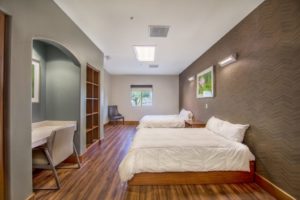Healthcare facilities face a unique challenge: they must be accessible to people of all types and levels of physical and mental limitations. How can the healthcare industry respond while handling a growing volume of patients? The answer lies in universal design products and principles.
“Hospitals and the architects designing them want to have patient rooms that can be used for multiple purposes. That’s where we come in,” says Sam Chapo, Business Development Manager for Behavioral Safety Products, which designs and manufactures ligature-resistant building products for suicide prevention.

“Hospitals are moving away from single-use rooms toward multi-use rooms as they want to be able to have a room designed for multiple scenarios and patients. The desire is to have rooms that are both safe for patients but also atheistically pleasing.”
What Is Universal Design?
Universal design is the concept of designing an environment to be accessible and effective for all patients’ needs, or as many patients’ needs as possible. A hospital room that is designed to be accessible to patients with disabilities and mobility limitations, while also safe for patients with mental illnesses, yet comfortable, calming and aesthetically pleasing for all patients is a good example of universal design.

“At Behavioral Safety Products, we’re trying to make products not only safe for the patient but pleasing to look at,” Chapo says. “Many of our products are powder coated white which gives a softer, more pleasing appearance than something such as stainless steel. Plumbing fixtures and toilet and bath accessories that are stainless steel or brushed steel can give the appearance or feeling of a jail cell and can therefore, cause undue stress on a patient. We want to ensure that patient’s feel like they are at home or in a hotel room rather than in a cell.”
“Most of our products are approved by the New York State Office of Mental Health, which publishes a patient safety standards and materials guideline for the design of mental health facilities in New York. This guide has become a measuring stick in design and product selection for architects and facilities across the U.S. as they can consult this guide for approval on what products should and shouldn’t be used in their patient facilities.”
Behavioral Safety’s Contribution to Universal Design
Universal design is a good investment for facilities in the short- and long-term. It allows organizations to scale their services regardless of their current or future patients’ needs.
Take Behavioral Safety Products, for example. Before the company was founded in 2008, there was no single source for suicide preventive and ligature-resistant building products.
“Our founder, Lee deLoache, started in the construction business as a Mechanical Engineer and Project Manager constructing psychiatric hospitals,” Chapo explains. “At the time, he found it very difficult to find a single source for proven safety products to go into the facilities to keep patients safe. So, he thought, ‘If I can’t find them, why not make them?’”
The Benefits of Universal Design as Healthcare Needs Grow
The healthcare industry is already struggling to handle the volume of patients.
Baby boomers are now reaching an age when more of them will have mobility limitations and disabilities. According to the American Association of Geriatric Psychiatry, 20% of people age 55 years or older experience some type of mental health concern, including anxiety, severe cognitive impairment or mood disorders such as depression or bipolar disorder. Healthcare facilities must be able to accommodate more patients with these needs. That trend highlights the need for ligature-resistant products in universal design.
Healthcare facilities that follow universal design principles have more flexibility. Every room can accommodate someone with disabilities or mental health difficulties.
Finally, healthcare facilities that adhere to universal design can quickly adjust to patients’ changing needs. For example, if a patient comes in for a heart condition and later exhibits mental health problems, a room change won’t be necessary.
Improving Healthcare Through Innovation
“Innovation never rests,” Chapo says. “We know that the healthcare market continues to change, and our goal is to meet the needs of patients and the facilities that our products are going into.”
Universal design is the next step in making healthcare more efficient and easier to accommodate each patient’s needs. The team at Behavioral Safety is proud to be ahead of the curve.
“It’s not just about business for us. It’s not just about making money. We believe that every life is sacred and important and therefore should be protected. That’s why we do what we do, because we want everyone to live a full life of happiness. At the core, that’s why we do what we do,” Chapo says.
Now more than ever, healthcare organizations need to be ready to accommodate today’s rapidly aging population. Updating facilities to meet building and safety codes and keeping design aesthetics in mind can help healthcare companies satisfy the growing demand for universal design.
To learn more about Behavioral Safety Products and their universal design solutions, visit Behavioral Safety’s updated product pages.
Written By Candace Shackelford

